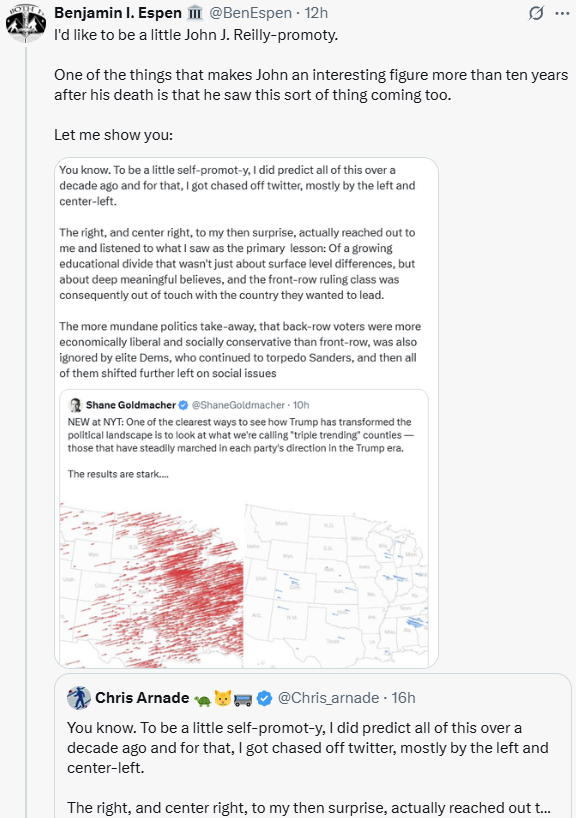The Long View 2008-03-17: St. Patrick's Day
Topical commentary on the events of the day from John J. Reilly.

Saint Patrick's Day
Financial Chaos, Now and Then: Regarding Now, I don't think I would add much to these comments by Ambrose Evans-Pritchard of the Telegraph UK:
Albert Edwards, global strategist at Societe Generale, said the toppling banks are merely a symptom of a deeper rot. "The banks are not the problem. Nor even the grotesquely leveraged funds. The problem is that an economic bubble financed by ridiculously loose monetary policy is unravelling," he said.
"US house prices have a lot further to fall, which will simply crush the global economy. The lesson from Japan in the early 1990s is that the death dance goes on and on and on," he said.
Well, maybe I would add this.
Song China invented paper money, more or less as we know it today, complete with a kind of monetary theory. Paper money is a great advantage for any economy, but a great deal of discipline is needed to keep the system working. That discipline was not in conspicuous evidence among the Mongols, who overthrew the Song, or the following Ming Dynasty: all they saw was that they had a machine that printed free money. The paper finance-system evaporated in inflation. The result was that, by the latter Ming period, China was back to using ingots of silver, supplemented by some commercial paper.
I wonder whether we may not be doing the same thing with central banks. They are a wonderful invention, but there is always a political temptation to leave the monetary spigot fully open all the time. The central banks can rescue the system, a few times per decade. When there is a world-record bailout every week, however, these rescues just become part of the background noise. The Japanese central bank discovered in the 1990s that it could push liquidity into the economy almost at gunpoint and still not rise out of recession.
On the other hand, there is this:
You have to go back to the banking crisis of the Great Depression to find a moment when the financial system as a whole seemed so close to the precipice.
Although 4,000 US banks failed in the early 1930s (mostly small ones), it was a long-drawn out affair. The bank runs began in the Prairies as falling food prices caused farmers to default in 1930. It seemed to be a local problem.
The crisis reached New York in December 1930 when the Bank of the United States succumbed to panic withdrawals. Legend has it that the 'WASP' clearing banks refused to back a rescue because of the bank's Jewish links.
In those days the contagion spread slowly to the rest of the world. It is much swifter now. The Swiss bank UBS has suffered US sub-prime losses on a scale to match Merrill Lynch and Citigroup, thanks to the curse of mortgage securities.
There are many reasons the financial collapse around 1930 was so deep and profound, but part of the problem was the sheer mechanical difficulty of processing the information. That is not an issue today.
* * *
Damn, Double Damn, and Damn with handles:
The Cassini spacecraft has beamed home the most detailed views yet of Saturn's moon Enceladus despite a software glitch that prevented a key instrument from sampling the satellite's geyser-like ice plumes during a flyby...But one tool, known as the Cosmic Dust Analyzer and Ion and Neutral Mass Spectrometer, hung up while switching between two versions of software and did not record data as Cassini flew through the plumes.
The Great Galactic Ghoul has retreated to the outer solar system, perhaps.
* * *
As if this weren't enough, Mark Steyn is exasperated by the public linking of his persecution by various Canadian Human Rights Commissions with protests by provocative filmmakers against recent steps in Ottawa to cut their subsidies:
But what my...reader was demanding to know was whether I, as a self-declared crusader for free speech in Maclean's battle against Canada's "human rights" commissions, would have the consistency and integrity to defend these filmmakers against the attempts of Bill C-10 to suppress their free speech. Answer: no. These two things are not the same. As Andrew Coyne argued trenchantly last week, it's not censorship to deny someone public funding...But free money is not the same as free speech. ...[despite the fact that] David Cronenberg [says that defunding such films would be] "a direct assault on the Charter of Rights and Freedoms," not to mention "like something they'd do in Beijing."
Steyn is right to be appalled at the conflation of his case with that of the filmmakers who fear that the Canadian government may no longer support them in the manner to which they had become accustomed. The confusion is not just foolish; it is dangerous. To riff on some comments I have made previously, it makes a difference whether "free speech" is used chiefly to refer to a right to subsidies for slasher movies or (as in Steyn's case) the right to make a frank expose' of a dangerous political project. People will take great risks to defend the latter, but not the former. If the same term covers both things, however, then they could both be abolished by the same mechanisms at the same time.
Copyright © 2008 by John J. Reilly



Comments ()